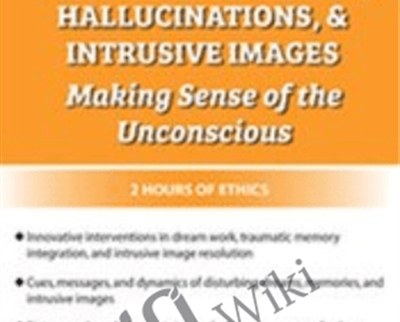The Clinician’s Guide to Dreams, Traumatic Memories, Hallucinations, and Intrusive Images: Making Sense of the Unconscious – Gary Massey
The Clinician’s Guide to Dreams, Traumatic Memories, Hallucinations, and Intrusive Images: Making Sense of the Unconscious – Gary Massey Download. Dream wo…

Original price was: $199.99.$55.00Current price is: $55.00.
Contents
Salepage link: At HERE. Archive:
Reflections and Traces of the Unconscious
Dream work and therapeutic image modification is an often neglected yet valuable inroad and component to healing, wellness, and effective treatment. You don’t need a breakdown of the mental health statistics to know that disturbing dreams, PTSD flashbacks, traumatic memories, hallucinations, obsessive fantasies, and unbidden intrusive images frequently impact and contribute to personal decompensation, mood/thought dysregulation, at-risk behavior, and interpersonal disturbance. As mental health practitioners, we must lead the way to properly assess, treat, and intervene as necessary with our patients and at-risk clients; yet many mental health professionals are not fully prepared or thoroughly trained for such crucial tasks.
This in-depth course provides the latest research and evidence-based therapeutic tools for effectively intervening with your clients’ dreams, traumatic memories, and unbidden images. Learn innovative and proven therapeutic assessment and intervention methods for effective psychological triage, psychoeducation, and practical daily life coping skills. In conjunction with fine-tuning professional dream work and therapeutic imagery processes and methods needed to meaningfully address and treat your clients, you gain two hours of ethics by examining clinical practice challenges, mistakes, and scenarios. Workshop participants are encouraged to bring their own or a patient’s intriguing dreams or disturbing images for workshop training in more effective dream work and therapeutic imagery processing and integration, while of course maintaining anonymity without specific identifiers.
- Identify meaningful dream and imagery cues, themes, and components characteristic of child, adolescent, adult, elder, and gender with sensitivity to cultural/ethnic issues and considerations
- Explore six theories, innovative approaches, and proven methods of dream work and therapeutic imagery methods
- Recognize crucial dream, imagery, and traumatic memory components and dynamics, and relate them to clinical intervention options
- Apply effective therapeutic dream work, traumatic memory integration, and imagery approaches and clincial intervention methods relevant to inpatient, outpatient, and educational contexts
- Incorporate six research-based components of an individual wellness recovery plan into clincial practice utilizing real life problems, images, and scenarios
- Explore legal and ethical issues, dilemmas, and considerations impacting dream work and therapeutic imagery to ensure quality treatment consistent with state and professional standards
DREAMS, TRAUMATIC MEMORY, DISTURBING IMAGES & BRAIN FUNCTIONING
- Stages of sleep, brainwaves, and sleep-wake cycle
- Basic neurobiology and brain functioning during dreaming, traumatic memory, and waking imagery with updated research findings
- Psychological models of the human conscious, pre-conscious, personal unconscious, and collective unconscious
- Gender and cultural/ethnic influences and considerations
RISK ASSESSMENT
- Guidelines, formats, and methods at critical junctures of treatment and beyond
- Determining and identifying precursors, stressors, cues, and triggers
THEORIES & INTERVENTION APPROACHES
- Dream, traumatic memory, hallucinations, and intrusive image dynamics
- Freudian, Adlerian, Ericksonian, Jungian, Redecision/TA/Gestalt, Senoi and Creative Problem-Solving theories and approaches
- Intervention and modification guidelines, methods, and techniques
- Indicators of improvement, health, wellness, compensation, decompensation, illness, change, resolution, and realignment
- Application to individual and group psychotherapy
EVIDENCE-BASED TREATMENT METHODS & INTERVENTIONS
TREATMENT & WELLNESS RECOVERY PLANS
- Addressing sleep disturbance and disorders
- Collaborative development and implementation
- Precursors and triggers
- Cues and warning signs
- Practical coping skills
- Patient-family education
- Necessary support person(s) involvement/debriefing
- Social resource enhancement
ETHICAL DILEMMAS
- Practical contextual guidelines
- Ethical challenges
Group case studies exploring pivotal treatment junctures, risk indicators, intervention options, recommendations, and follow-up
Review by NLP
Review by NLP
Reviews (0)
User Reviews
Only logged in customers who have purchased this product may leave a review.









There are no reviews yet.